2023-09-21 Thu
■ #5260. 喜びに満ちた delicious の同根類義語 [eebo][synonym][me][cognate][lexicology][borrowing][loan_word][latin][french][oed][thesaurus][htoed][voicy][heldio]
今週の月・火と連続して,Voicy 「英語の語源が身につくラジオ (heldio)」(毎朝6時に配信)にて delicious とその類義語の話題を配信しました.
・ 「#840. delicious, delectable, delightful」
・ 「#841. deleicious の歴史的類義語がたいへんなことになっていた」
かつて「#283. delectable と delight」 ([2010-02-04-1]) と題する記事を書いたことがあり,これとも密接に関わる話題です.ラテン語動詞 dēlectāre (誘惑する,魅了する,喜ばせる)に基づく形容詞が様々に派生し,いろいろな形態が中英語期にフランス語を経由して借用されました(ほかに,それらを横目に英語側で形成された同根の形容詞もありました).いずれの形容詞も「喜びを与える,喜ばせる,愉快な,楽しい;おいしい,美味の,芳しい」などのポジティヴな意味を表わし,緩く類義語といってよい単語群を構成していました.
しかし,さすがに同根の類義語がたくさんあっても競合するだけで,個々の存在意義が薄くなります.なかには廃語になるもの,ほとんど用いられないものも出てくるのが道理です.
Historical Thesaurus of the Oxford English Dictionary (= HTOED) で調べてみたところ,歴史的には13の「delicious 語」が浮上してきました.いずれも語源的に dēlectāre に遡りうる同根類義語です.以下に一覧します.
・ †delite (c1225--1500): Very pleasant or enjoyable; delightful.
・ delightable (c1300--): Very pleasing or appealing; delightful.
・ delicate (a1382--1911): That causes pleasure or delight; very pleasing to the senses, luxurious; pleasurable, esp. in a way which promotes calm or relaxation. Obsolete.
・ delightful (a1400--): Giving or providing delight; very pleasant, charming.
・ delicious (c1400?-): Very pleasant or enjoyable; very agreeable; delightful; wonderful.
・ delectable (c1415--): Delightful; extremely pleasant or appealing, (in later use) esp. to the senses; very attractive. Of food, drink, etc.: delicious, very appetizing.
・ delighting (?a1425--): That gives or causes delight; very pleasing, delightful.
・ †delitous (a1425): Very pleasant or enjoyable; delightful.
・ delightsome (c1484--): Giving or providing delight; = delightful, adj. 1.
・ †delectary (?c1500): Very pleasant; delightful.
・ delighted (1595--1677): That is a cause or source of delight; delightful. Obsolete.
・ dilly (1909--): Delightful; delicious.
・ delish (1915--): Extremely pleasing to the senses; (chiefly) very tasty or appetizing. Sometimes of a person: very attractive. Cf. delicious, adj. A.1.
廃語になった語もあるのは確かですが,意外と多くが(おおよそ低頻度語であるとはいえ)現役で生き残っているのが,むしろ驚きです.「喜びを与える,愉快な;おいしい」という基本義で普通に用いられるものは,実際的にいえば delicious, delectable, delightful くらいのものでしょう.
このような語彙の無駄遣い,あるいは類義語の余剰といった問題は,英語では決して稀ではありません.関連して,「#3157. 華麗なる splendid の同根類義語」 ([2017-12-18-1]),「#4969. splendid の同根類義語のタイムライン」 ([2022-12-04-1]),「#4974. †splendidious, †splendidous, †splendious の惨めな頻度 --- EEBO corpus より」 ([2022-12-09-1]) もご覧ください.
2023-06-04 Sun
■ #5151. 日本語反対語辞典の「まえがき」より [lexicology][semantics][antonymy][synonym][structuralism][thesaurus][dictionary]
「反対語」「対義語」「対照語」「対応語」などと称される antonym は,語彙意味論においても関心を集めてきた.私も反対語辞典の類いは好きでよく引くのだが,日本語で常用しているものとして『反対語対照語辞典 新装版』がある.
反対語といっても「反対」のあり方は様々で,語彙意味論でもまさにその点が問題となる.上記の辞典の「まえがき」 (i--ii) を読めば,その難しさとおもしろさが理解できるだろう.
単語は一つ一つがばらばらに存在しているのではなく,まとまりをもち,いわばネットワークをなしている.たとえば「父」という単語は,「お父さん」「おやじ」「パパ」などと言い換えることができる.これら四語は,同じものを指している.四語の間には敬意の有無やニュアンスの違いなどがあり,完全に同義であるとはいえないが,同義に近い関係ーー類義の関係ーーにあるということができる.一方,「父」の対として「母」という語がある.そして,「母」にも「お母さん」「おふくろ」「ママ」といったような類義の語が存在する.また,「父」と「母」の両者を包含する語として「親」があり,「親」の対として「子」という語がある.このように,単語は相互に関連して複雑な組織網を形成している.
反対語の定義はきわめて難しい.同義語・類義語には同じものを指すといった基準があるが,反対語の条件は単純ではない.反対語という場合,まず両者の間に共通する意味がなければならない.「母」が「父」の反対語になるのは,両者が<親>という共通の意味をもっているからである.しかし,共通する意味をもっているだけでは,もちろん反対語にはならない.「母」が「父」の反対語になるのは,男性ではなく女性であるということによる.つまり,男性か女性かという基準から見て反対の意味になるのである.反対語の条件は,
(1) 共通する意味をもっていること
(2) その上で,ある基準から見て,反対の意味をもっていること
の二点であるということになるだろう.
もう一つの例をあげよう.「大勝」の反対語には,「大敗」と「辛勝」とがあげられるが,前者は,(1) 大差で勝負がつくという共通点をもち,(2) 勝ち負けという基準から見て反対の意味をもっており,後者,つまり「辛勝」は,(1) 勝つという共通の意味をもち,(2) 勝ち方が大差か小差かという基準から見て反対の意味をもっている.ある語の反対語は,一つとは限らない.基準が変わると,いくつも存在することになる.
以上のように説明すると,反対語の判定は比較的容易なように見えるが,一語一語について具体的に考えていく段になると,反対の意味とは何かということが問題になってきて,判断に苦しむことが多い.
上記で例に挙げられている「大勝」に関する辞典内の図を参照しよう.構造主義的な,きれいなマトリックスとなる.
| <大差> | <小差> | ||
| <勝利> | 圧勝(大勝・快勝) | ←───→ | 辛勝 |
| ↑ | ↑ | ||
| │ | │ | ||
| ↓ | ↓ | ||
| <敗北> | 惨敗(大敗・完敗) | ←───→ | 惜敗 |
しかし,多くの場合,そこまできれいなマトリックスにはならない.反対関係はもっと複雑になることも多い.例えば「水」を中心とした語彙の関係図を示そう.
┌─┐ │油│ └─┘ ┌─┐ ↑ ┌─┐ │ │ │ │ │ │ │ ↓ │ │ │水│←──────→┌─┐ │ │ │ │ ┌─┐ │ │ │ │ │蒸│ │湯│←─→│水│←─→│氷│ │ │ └─┘ │ │ │ │ │気│ └─┘ │ │ │ │ ↑ │ │ │ │←────────┼───→│ │ └─┘ ↓ └─┘ ┌─┐ │火│ └─┘
反対語の意味論については,hellog および heldio より以下を参照.
・ hellog 「#1800. 様々な反対語」 ([2014-04-01-1])
・ hellog 「#1804. gradable antonym の意味論」 ([2014-04-05-1])
・ hellog 「#1968. 語の意味の成分分析」 ([2014-09-16-1])
・ hellog 「#4102. 反意と極性」 ([2020-07-20-1])
・ heldio 「#353. 反対語っていろいろあっておもしろい!」
・ heldio 「#354. long と short は対等な反対語ではない?」
・ 北原 保雄・東郷 吉男(編) 『反対語対照語辞典 新装版』 東京堂出版,2015年.
2021-09-16 Thu
■ #4525. 「性交」を表わす語を上から下まで [taboo][euphemism][swearing][slang][thesaurus]
古今東西の言語で,性に関する語句はタブー (taboo) となりやすく,様々な婉曲表現 (euphemism) が発達するのが通例である.英語でも「性交」を意味する語句は枚挙にいとまがない.公的に用いても問題ない「上」の語句から,俗語 (slang) として日陰でしか使われない「下」の語句まで,実に幅広い.Hughes (242) がその氷山の一角として,次のように挙げている.
reproduction
generation
copulation
coition
intercourse
congress
intimacy
carnal knowledge
coupling
pairing
mating
at roughly which point the line is drawn, below which are found:
shagging
banging
bonking
fucking
上下を2分するおよその線が下から5行目に引かれているが,本当は下のクラスに属する語句の方が圧倒的に多い.書き切れないし書くのも憚られるものが多いので,あえて省略しているということだろう.憚られるものをいくつか小声で紹介すれば beast with two backs, bum dancing, bottom wetting, a squirt and a squeeze など.この目的で俗語辞典をめくってみれば,数百件はくだらない(大多数が下のクラス).
上下を分ける線の位置については,そもそも絶対的に定めることはできない.判断は個人によっても異なるし,時代によっても変化してきた.おそらく世代間でも線引きの仕方や認識はいくらか異なるだろう.調べてみれば,興味深い通時的研究になりそうだ.
・ Hughes, Geoffrey. Swearing: A Social History of Foul Language, Oaths and Profanity in English. London: Penguin, 1998.
2021-05-30 Sun
■ #4416. トイレの英語文化史 --- 英語史語彙論研究入門 [taboo][euphemism][khelf_hel_intro_2021][thesaurus][dictionary][lexicology][htoed][semantics][synonym][slang][hel_education][bibliography][link]
4月5日より始まっていた「英語史導入企画2021」のコンテンツ紹介記事は,今回で最終回となります.話題は「office, john, House of Lords --- トイレの呼び方」です.トリを飾るに相応しいテーマですね! トイレの英語文化史あるいは英語文化誌というべき内容で,Historical Thesaurus of the Oxford English Dictionary (= HTOED) を用いてこんなにおもしろい調査ができるのかと教えてくれるコンテンツです.コンテンツ内の図と点線を追っていくだけで,トイレの悠久の旅を楽しむことができます.
タブー (taboo),婉曲表現 (euphemism),類義語 (synonym) といった語彙論 (lexicology) 上の問題は,英語史の卒業論文研究などでも人気のテーマです.英語史語彙論研究に関心をもったら,これらのタグの付いた hellog の記事群を読んでみてください.また,以下に今回のコンテンツと緩く関連した記事も紹介しておきます.
・ 「#470. toilet の豊富な婉曲表現」 ([2010-08-10-1])
・ 「#471. toilet の豊富な婉曲表現を WordNet と Visuwords でみる」 ([2010-08-11-1])
・ 「#992. 強意語と「限界効用逓減の法則」」 ([2012-01-14-1])
・ 「#1219. 強意語はなぜ種類が豊富か」 ([2012-08-28-1])
・ 「#3885. 『英語教育』の連載第10回「なぜ英語には類義語が多いのか」」 ([2019-12-16-1])
・ 「#3392. 同義語と類義語」 ([2018-08-10-1])
・ 「#469. euphemism の作り方」 ([2010-08-09-1])
・ 「#4395. 英語の類義語について調べたいと思ったら」 ([2021-05-09-1])
・ 「#3159. HTOED」 ([2017-12-20-1])
・ 「#847. Oxford Learner's Thesaurus」 ([2011-08-22-1])
・ 「#4334. 婉曲語法 (euphemism) についての書誌」 ([2021-03-09-1])
・ 「#1270. 類義語ネットワークの可視化ツールと類義語辞書」 ([2012-10-18-1])
・ 「#1432. もう1つの類義語ネットワーク「instaGrok」と連想語列挙ツール」 ([2013-03-29-1])
・ 「#4092. shit, ordure, excrement --- 語彙の3層構造の最強例」 ([2020-07-10-1])
・ 「#4041. 「言語におけるタブー」の記事セット」 ([2020-05-20-1])
2021-05-09 Sun
■ #4395. 英語の類義語について調べたいと思ったら [khelf_hel_intro_2021][thesaurus][dictionary][lexicology][htoed][semantics][synonym][corpus][methodology]
英語を学ぶ上で,類義語 (synonym) というのは厄介です.訳語としては同じなのに,実際にはニュアンスの違いがあるというのだから手間がかかります.一般に言語において完全な同義語はないとされますが,意味が微妙に異なる類義語というのは,思っている以上に多く存在します.
日本語で考えてみれば,類義語の多さにはすぐに気づくでしょう.「疲れる」の類義語を挙げてみましょう.「くたびれる」「くたばる」「へたばる」「へばる」「グロッキー」「バテる」「疲労する」「困憊する」「へとへとになる」「ふらふらになる」「疲れ切る」など,それぞれ独特のコノテーションがありますね.
英語で「疲れた」といえば,第一に tired が思い浮かびますが,他に exhausted, drained, weary, worn out, shattered, pooped, fatigued などもあります.学習するには厄介ですが,各々独自のコノテーションをもっており存在意義があるようです.昨日の「英語史導入企画2021」のためのコンテンツは,学部生による「「疲れた」って表現,多すぎない?」です.こちらもご覧ください.
このような類義語に関心をもったら,まず当たるべきは学習者用の英英辞典です.例えば Longman Dictionary of Contemporary English (= LDOCE) などでは,たいてい主要な見出し語(例えば tired)のもとに,THESAURUS という類義語コーナーが設けられており,各類義語の使い分けが簡潔に記されています.
thesaurus というのは,ずばり類義語辞典のこと.とすれば,類義語辞典そのものに当たるのが早いといえば早いですね.例えば,Oxford Learner's Thesaurus によれば,各類義語のニュアンス,用例,コロケーションが細かく解説されています.以下のように,どんどん記述が続いていきます.かゆいところに手が届く辞典ですね.
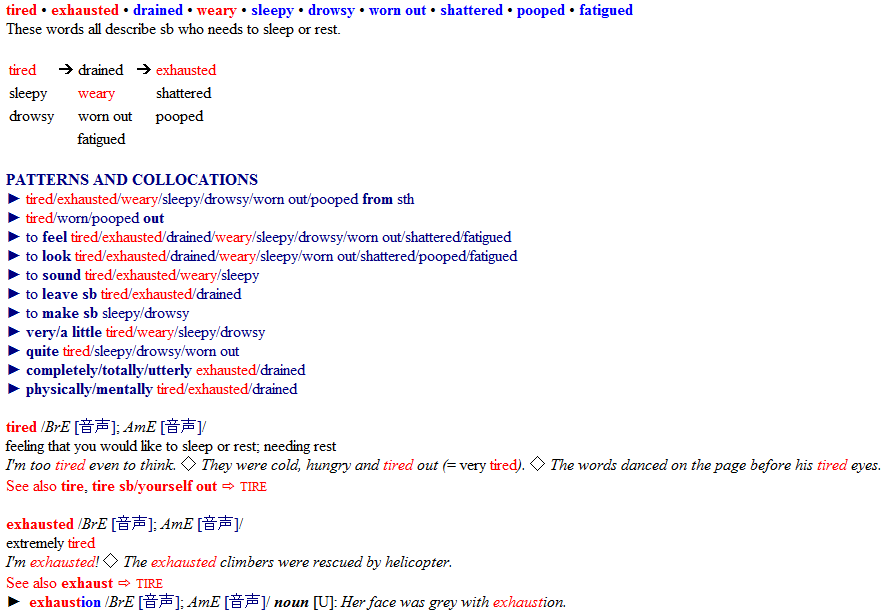
さらに詳しく調べたいのであれば,各類義語が用いられている「現場」からの事例を多数集めて分析することが必要になります.こうなるとコーパスの利用が有用です.まずは,イギリス英語とアメリカ英語の各々について,BNCweb と COCA というコーパスに当たってみるのがお薦めです.
「英語史導入企画2021」の開催中ということで,かなり高度な研究ツールながらも歴史的類義語辞典なるもの紹介しておきましょう.Historical Thesaurus of the Oxford English Dictionary (= HTOED) です.詳細は「#3159. HTOED」 ([2017-12-20-1]) をどうぞ.
2021-03-09 Tue
■ #4334. 婉曲語法 (euphemism) についての書誌 [euphemism][bibliography][semantics][lexicology][taboo][slang][swearing][sociolinguistics][thesaurus][terminology][hel_education]
英語の語彙や意味の問題として,婉曲語法 (euphemism) は学生にも常に人気のあるテーマである.隣接領域として taboo, swearing, slang のテーマとも関わり,社会言語学寄りの語彙の問題として広く興味を引くもののようだ.
そもそも euphemism とは何か.まずは Cruse の用語辞典より解説を与えよう (57--58) .
euphemism An expression that refers to something that people hesitate to mention lest it cause offence, but which lessens the offensiveness by referring indirectly in some way. The most common topics for which we use euphemisms are sexual activity and sex organs, and bodily functions such as defecation and urination, but euphemisms can also be found in reference to death, aspects of religion and money. The main strategies of indirectness are metonymy, generalisation, metaphor and phonological deformation.
Sex:
intercourse go to bed with (metonymy), do it (generalisation)
penis His member was clearly visible (generalisation)
Bodily function:
defecate go to the toilet (metonymy), use the toilet (generalisation)
Death:
die pass away (metaphor), He's no longer with us (generalisation)
Religion:
God gosh, golly (phonological deformation)
Jesus gee whiz (phonological deformation)
Hell heck (phonological deformation)
この種の問題に関心をもったら,まずは本ブログより「#469. euphemism の作り方」 ([2010-08-09-1]),「#470. toilet の豊富な婉曲表現」 ([2010-08-10-1]),「#992. 強意語と「限界効用逓減の法則」」 ([2012-01-14-1]) を始めとして (euphemism) の記事群,それから taboo の記事群にも広く目を通してもらいたい.
その後,以下の概説書の該当部分に当たるとよい.
・ Williams, Joseph M. Origins of the English Language: A Social and Linguistic History. New York: Free P, 1975. pp. 198--203.
・ Hughes, G. A History of English Words. Oxford: Blackwell, 2000. pp. 43--49.
・ Brinton, Laurel J. and Leslie K. Arnovick. The English Language: A Linguistic History. Oxford: OUP, 2006. pp. 80--81.
書籍レベルとしては,Bussmann (157) と McArthur (387) の参考文献リストより,以下を掲げる.
・ Allan, K. and K. Burridge. Euphemism and Dysphemism: Language Used as a Shield and Weapon. New York: OUP, 1991.
・ Ayto, J. Euphemisms: Over 3,000 Ways to Avoid Being Rude or Giving Offence. London: 1993.
・ Enright, D. J., ed. Fair of Speech: The Uses of Euphemism. Oxford: OUP, 1985.
・ Holder, R. W. A Dictionary of American and British Euphemisms: The Language of Evasion, Hypocrisy, Prudery and Deceit. Rev. ed. London: 1989. Bath: Bath UP, 1985.
・ Lawrence, J. Unmentionable and Other Euphemisms. London: 1973.
・ Rawson, Hugh. A Dictionary of Euphemisms & Other Doubletalk. New York: Crown, 1981.
具体的な語の調査にあたっては,もちろん OED,各種の類義語辞典 (thesaurus),Room の語の意味変化の辞典などをおおいに活用してもらいたい.
・ Cruse, Alan. A Glossary of Semantics and Pragmatics. Edinburgh: Edinburgh UP, 2006.
・ Bussmann, Hadumod. Routledge Dictionary of Language and Linguistics. Trans. and ed. Gregory Trauth and Kerstin Kazzizi. London: Routledge, 1996.
・ McArthur, Tom, ed. The Oxford Companion to the English Language. Oxford: OUP, 1992.
・ Room, Adrian, ed. NTC's Dictionary of Changes in Meanings. Lincolnwood: NTC, 1991.
2018-08-10 Fri
■ #3392. 同義語と類義語 [semantics][lexicology][thesaurus]
標題の2つの用語は言語学ではいずれもよく使われるが,はたして同じものなのか,それとも異なるのか.語の意味にまつわる話題であり,案外難しい問題である.実用上は,厳密に定義を与えないままに,両用語を「適当に,常識的に」使用し(分け)ているものと思われる.実際,英語の synonym は「同義語」にも「類義語」にも相当するのだ.
一般的には,語義が完全に一致する「完全同義語」 (absolute synonym) のペアは(ほとんど)ないと言われる (cf. 「#1498. taboo が言語学的な話題となる理由 (3)」 ([2013-06-03-1])) .ということは,synonym という用語が有意味となるためには,「完全同義語」ではなく「不完全同義語」を,すなわち「類義語」ほどを指していることが望ましい.一方,英語には near-synonym あるいはより専門的に plesionym (< Gr. plēsios (近接した) + onoma (名前)) という用語もある.ここから,synonym, near-synonym, plesionym という用語は,それこそ互いに synonymous な関係にあると解釈できそうである.語義の似ている度合いというのは数値化できるわけでもなく,当然ながら微妙な問題になることはやむを得ない.
Cruse (176--77) の意味論の用語辞典の説明を覗いてみよう.
synonymy, synonyms A word is said to be a synonym of another word in the same language if one or more of its senses bears a sufficiently close similarity to one or more of the senses of the other word. It should be noted that complete identity of meaning (absolute synonymy) is very rarely, if ever, encountered. Words would be absolute synonyms if there were no contexts in which substituting one for the other had any semantic effect. However, given that a basic function of words is to be semantically distinctive, it is not surprising that such identical pairs are rare. That being so, the problem of characterising synonymy is one of specifying what kind and degree of semantic difference is permitted. One possibility is to define synonymy as 'propositional synonymy': two words A and B are synonyms if substituting either one for the other in an utterance has no effect on the propositional meaning (i.e. truth conditions) of the utterance. This is the case with, for instance, begin: commence and false: untrue (on the relevant readings):
The concert began/commenced with Beethoven's Egmont Overture.
What he told me was false/untrue.
By this definition, synonyms will typically differ in respect of non-propositional aspects of meaning, such as expressive meaning and evoked meaning. Thus, begin and commence differ in register; the difference between false and untrue (indicating lack of veracity) is rather subtle, but the former is more condemnatory, perhaps because of a stronger presumption of deliberateness. However, while this is a convenient and easily applied way of defining synonymy, it does not capture the way the notion is used by, for instance, lexicographers, in the compilation of dictionaries of synonyms or in the assembly of groups of words for information on 'synonym discrimination'. Certainly, some of the words in such lists are propositional synonyms, but others are not, and for these we need some such notion as 'near-synonymy' ('plesionymy'). This is not easy to define, but roughly speaking, near-synonyms must share the same core meaning and must not have the primary function of contrasting with one another in their most typical contexts. (For instance, collie and spaniel share much of their meaning, but they contrast in their most typical contexts.) Examples of near-synonyms are: murder: execute: assassinate; withhold: detain; joyful: cheerful; heighten: enhance; injure: damage; idle: inert: passive.
synonyms を分析するにあたって,命題的意味 (propositional meaning) と非命題的意味 (non-propositional meaning) を区別するという方法は確かにわかりやすい.これは概念的意味 (conceptual meaning) と非概念的意味 (non-conceptual meaning) の区別にも近いだろう(「#1931. 非概念的意味」 ([2014-08-10-1]) を参照).命題的意味や概念的意味はイコールだが,非命題的意味や非概念的意味が何かしら異なっている場合に,その2語を synonyms と呼ぼう,というわけだ.
しかし,類義語辞典などに挙げられている類義語リストを構成する各単語は,たいていさらに緩い意味で「似ている」単語群にすぎない.最も中心的な意味のみを共有しており,かつ互いに異なる周辺的な意味はあくまで2次的なものとして,当面はうっちゃっておけるほどの関係であれば (near-)synonyms と呼べるということになろうか.ややこしい問題ではある.
・ Cruse, Alan. A Glossary of Semantics and Pragmatics. Edinburgh: Edinburgh UP, 2006.
2018-03-19 Mon
■ #3248. 日本十進分類法 (NDC) 10版 [taxonomy][italic][thesaurus][semantics][htoed]
国立国会図書館では,平成29年4月より日本十進分類法 (NDC) の新訂10版が適用されている(こちらの案内を参照).10版の分類基準(2017年1月版)はこちら (PDF). *
9版から10版への内容的な変更はほとんどなく,用語の整備が主である.10版の綱目表(第2次区分表)に基づき,以下のマインドマップを作ってみた(PDF版やSVG版もどうぞ).
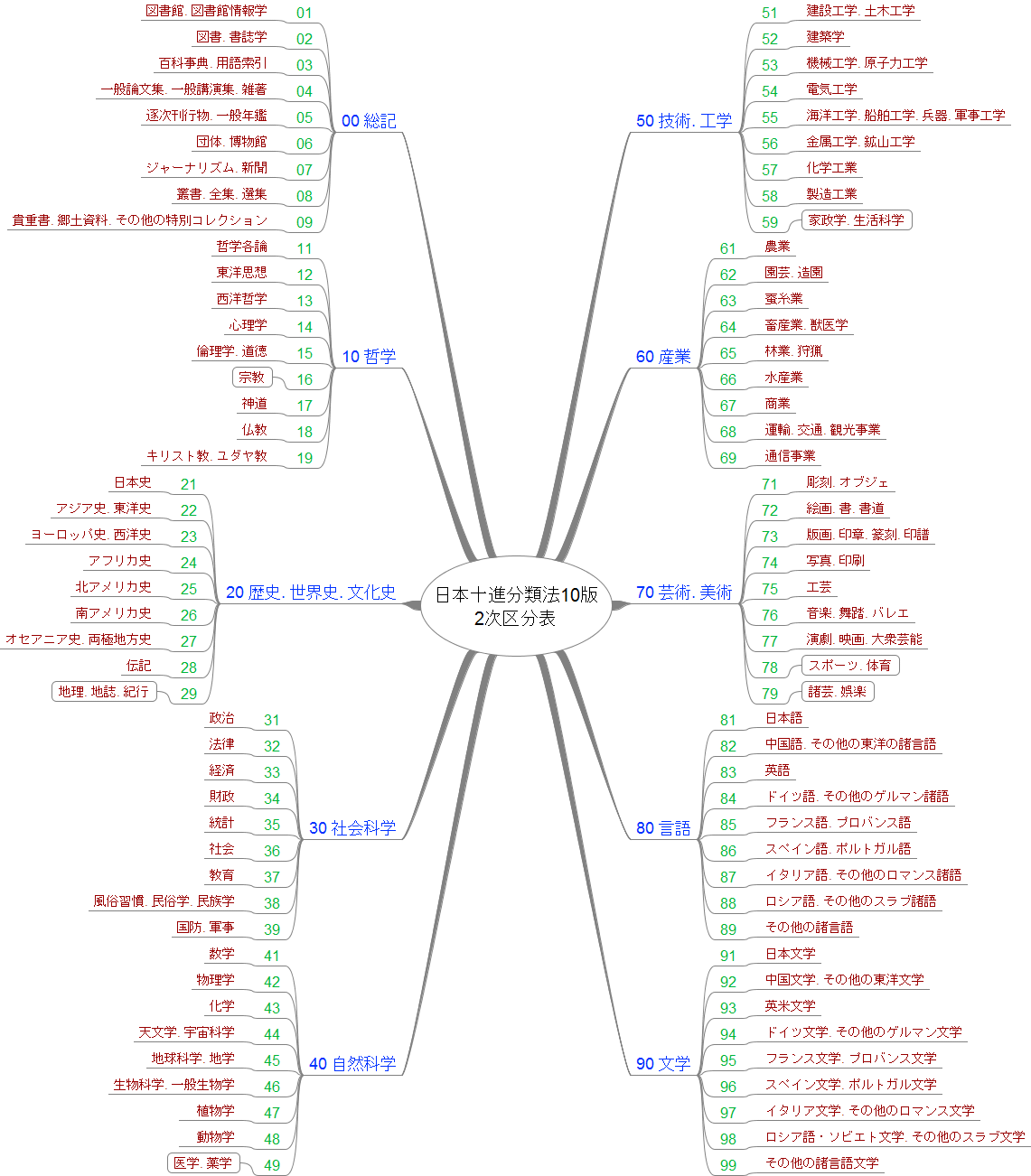
私の関心は特に「80 言語」あたりにあるが,9版から少し変わったのは,「84 ドイツ語」だったものが「84 ドイツ語.その他のゲルマン諸語」となったところである.同様に,「85 フランス語」「86 スペイン語」「87 イタリア語」もそれぞれ「85 フランス語.プロバンス語」「86 スペイン語.ポルトガル語」「87 イタリア語.その他のロマンス諸語」と名目上拡充された.「90 文学」の対応する部分にも同様の拡充が施されている.もちろん,このような拡充や細分化は始めればキリがないし,どこまで表記するかは,図書分類上の現実的な問題ともおおいに絡んで決定的な対処法はないだろう.
日本十進分類法は図書に関する分類法 (taxonomy) の1つだが,いわば百科事典的な分類法ともいえる.分類法といえば,意味論や類義語辞典 (thesaurus) 編纂においても意味分類は最も難しい問題だが,これらの諸分野は森羅万象の整理という共通の課題を抱えているとわかる.
英語史との関係でいえば,本格的な歴史的類義語辞典 HTOED の分類表を,「#3159. HTOED」 ([2017-12-20-1]) 経由で参照されたい.
2017-12-20 Wed
■ #3159. HTOED [thesaurus][lexicography][dictionary][semantics][semantic_change][link][htoed][taxonomy]
Historical Thesaurus of the Oxford English Dictionary (HTOED) は,英語の類義語辞典 (thesaurus) として最大のものであるだけでなく,「歴史的な」類義語辞典として,諸言語を通じても唯一の本格的なレファレンスである.1965年に Michael Samuels によって編纂プロジェクトののろしが上げられ,初版が完成するまでに約45年の歳月を要した(メイキングの詳細は The Story of the Thesaurus を参照) .
HTOED は,現在3つのバージョンで参照することができる.
(1) 2009年に出版された紙媒体の2巻本.第1巻がシソーラス本体,第2巻が索引である.Historical Thesaurus of the Oxford English Dictionary (HTOED). Ed. Christian Kay, Jane Roberts, Michael Samuels and Irené Wotherspoon. 2 vols. Oxford: OUP, 2009.
(2) グラスゴー大学の提供する (1) のオンライン版.The Historical Thesaurus of English として提供されている.
(3) OED Online に組み込まれたオンライン版.
各バージョン間には注意すべき差異がある.もともと HTOED は OED の第2版に基づいて編纂されたものであるため,第3版に向けて改変された内容を部分的に含む OED Online と連携しているオンライン版との間で,年代や意味範疇などについて違いがみられることがある.また,OED Online 版は,OED の方針に従って1150年以降に伝わっていない古英語単語がすべて省かれているので,古英語単語について中心的に調べる場合には A Thesaurus of Old English (TOE). Ed. Jane Roberts and Christian Kay with Lynne Grundy. Amsterdam: Rodopi, [1995] 2000. Available online at http://oldenglishthesaurus.arts.gla.ac.uk/ . の成果を収録した (1) か (2) の版を利用すべきである.
HTOED で採用されている意味範疇は,235,249項目にまで細分化されており,そこに793,733語が含まれている.分類の詳細は Classification のページを参照.第3階層までの分類表はこちら (PDF) からも参照できる. *
2017-12-18 Mon
■ #3157. 華麗なる splendid の同根類義語 [cognate][synonym][lexicology][inkhorn_term][emode][borrowing][loan_word][renaissance][thesaurus][htoed]
「#576. inkhorn term と英語辞書」 ([2010-11-24-1]) の記事で,ルネサンス期のラテン語かぶれの華美を代表する単語の1つとして splendidious を挙げた.この語は現在では廃用となっているが,その意味は現代でも普通に用いられる splendid と同じ「華麗な,豪華な」である.前者はルネサンス華やかなりし15世紀から用いられており,後者も単語としては17世紀前半には初出している(ただし,語義によって初出年代が異なる).この15--17世紀には,語根も意味も同じくする splendid 系の単語がいくつも現われては消えていったのである.HTOED より splendid の項を覗いてみると,次のようにある.
02.04.05.03 (adj.) Splendid
þurhbeorht OE ・ geatolic OE ・ torht OE ・ torhtlic OE ・ wrætlic OE ・ orgulous/orgillous a1400 ・ splendidious 1432/50--1653 ・ splendiferous c1460--1546 ・ splendent 1509-- ・ splendant 1590-- ・ splendorous 1591-- ・ splendidous 1605--1640 ・ transplendent 1622; 1854 ・ florid 1642--1725 ・ splendious 1654 ・ splendid 1815-- ・ splendescent 1848-- ・ nifty 1868-- ・ ducky 1897-- (colloq.) ・ many-splendoured a1907--
歴史的に splendidious, splendiferous, splendent, splendant, splendorous, splendidous, splendious, splendid, splendescent, splendoured の10語が,互いに比較的近接した時期に現われ,大概は後に消えている(ただし,手持ちの英和辞書では,splendiferous, splendent, splendorous は見出しが立てられていた).
基体(ラテン語あるいはフランス語由来)も意味も同じくする類義語 (synonym) がこのように複数あったところで,害こそあれ利はない.それで多くの語が競合し,自滅していったのだろう.
Kay and Allan (15) も,この語群に言及しつつ次のように述べている.
Sometimes there was a degree of experimentation over the form of a new word. In the sixteenth and seventeenth centuries, the OED records the following forms meaning 'splendid': splendant, splendicant, splendidious, splendidous, splendiferous, splendious and splendorous. Splendid itself is first recorded in 1624. Unsurprisingly, most of these forms were short-lived; no language needs quite so many similar words for the same concept.
対応する名詞についても HTOED より抜き出すと,"splendency a1591--1607 ・ splendancy 1591 ・ splendence 1604 ・ splendour 1774-- ・ splendiferousness 1934--" とやはり豊富である.
・ Kay, Christian and Kathryn Allan. English Historical Semantics. Edinburgh: Edinburgh UP, 2015.
2014-04-10 Thu
■ #1809. American Heritage Dictionary の Notes [dictionary][etymology][link][synonym][thesaurus]
「#485. 語源を知るためのオンライン辞書」 ([2010-08-25-1]) で触れたが,American Heritage Dictionary of the English Language, 4th ed. (AHD) とその他の辞書に基づいた The Free Dictionary というオンライン辞書がある.AHD は,アメリカの辞書らしく百科事典的な情報や視覚資料が豊富で,私もよく使うお気に入りの辞書だ.紙版は大型だが,読む辞書としてお薦めである.(なお,The Free Dictionary Encyclopedia の Article of the Day というフィードもお気に入り.)
特に注目したいのが,Notes と呼ばれるコラム的な記事が充実していることだ.Usage Notes, Synonym Notes, Word Histories, Our Living Language, Regional Notes といった5種類の Notes が,延べ1,700以上,辞書中にちりばめられている.以下では,取りこぼれもあるとは思われるが,その大多数へのリンクを拾い出した.長いリストなので,ジャンプのための目次を挙げておく.
・ Usage Notes 一覧
・ Synonym Notes 一覧
・ Word Histories 一覧
・ Our Living Language 一覧
・ Regional Notes 一覧
ほかにも,リンク先の Notes 部分のみを抜き出した Notes 集そのものもブラウザ上で閲覧できるように作ってみたが,1.6MBと重めなので,必要に応じてどうぞ.
[ Usage Notes ]
!Kung, -ee, -ess, -wise, .gov, a, A.M., aberrant, able, about, absolute, absolutely, accessory, acquiesce, act, acumen, ad hominem, admission, adopt, advance, advise, affect, affinity, agenda, aggravate, ain't, alibi, all, all right, alleged, allude, alongside, also, alternative, although, altogether, alumnus, Amerasian, Amerindian, and, and/or, Anglo, anticipate, antidote, anxious, any, anyone, apparent, archetype, as, as far as, Asian, Asiatic, assure, author, awhile, backward, bad, bait, baleful, banal, barbarism, barbiturate, be, bear, because, behalf, berdache, besides, best, between, bi-, black, Black English, blatant, boast, both, bring, but, callous, can, cannot, capital, careen, celebrant, celibate, center, certain, challenged, Chicano, child-directed speech, claustrophobic, cohort, collective noun, color, colored, compact disk, compare, complected, complement, complete, comprise, conflicted, contact, contemporary, continuance, contrast, controller, convince, council, couple, craft, credential, credible, crescendo, criterion, critique, culture, czar, dare, data, deaf, debut, deceptively, decimate, definite, demagogue, denote, depend, deprecate, dialogue, different, dilemma, disabled, discomfit, disingenuous, disinterested, disinvent, distinct, dive, domestic partner, double negative, doubt, dour, drunk, due to, each, each other, either, elder, else, empower, enervate, enormity, enthuse, envelope, epicenter, epithet, equal, err, escape, Eskimo, Eurasian, every, everyplace, except, exceptionable, fact, factoid, farther, February, few, finalize, First Nation, firstly, flammable, flaunt, flotsam, follow, foot, foregone, former, formidable, forte, fortuitous, founder, fulsome, fun, gambit, gay, gender, General American, get, glamour, good, gourmet, government, graduate, graffito, grieve, group, grow, handicapped, hang, harass, hardly, harebrained, have, he, headquarter, headquarters, healthy, hegemony, height, help, herb, hero, Hispanic, historic, hoi polloi, holocaust, homosexual, hopefully, host, however, hyphenated, I, identical, identify, if, impact, impeach, important, impracticable, include, Indian, individual, infer, infinite, infrastructure, input, insignia, intense, interface, intrigue, intuit, Inuit, ironic, irregardless, its, Jew, Jewess, kabbalah, Kanaka, kilometer, knot, kudos, lack, lady, late, Latina, lay, leave, legend, liable, lifestyle, light, like, likely, literally, literate, loan, look, majority, man, master, masterful, materialize, mean, medium, men, methodology, mid-, migrate, minimal, mistress, momentarily, month, moot, Ms., mute, mutual, myriad, myself, native, Native American, nauseous, need, neither, Net, none, nonstandard, nonwhite, nor, not, nothing, nuclear, number, oblivious, octoroon, of, off, officiate, often, old, on, one, only, or, oriental, ought, over-, pair, paradigm, parameter, participle, party, pass, people, percent, percentage, perfect, periodic, permit, person, peruse, phenomenon, pill bug, plead, plus, politics, poor, possessed, practicable, practically, precipitate, premiere, preposition, presently, principal, prioritize, process, protagonist, prove, quarter, queer, quick, quote, race, rarely, rather, redundancy, regard, replete, repulse, responsible, restive, sacrilegious, safe sex, said, salutation, same, saving, scarcely, schism, Scottish, seasonal, series, service, set, shall, she, short-lived, should, slow, sneak, so, so-called, someday, sometime, sonorous, soon, split infinitive, Standard English, status, staunch, stomp, stratum, strength, such, suffer, than, that, themed, there, they, this, Three Age system, thusly, tight, till, together, too, tortuous, toward, transpire, try, un-, unaware, unexceptionable, unique, utilize, various, verbal, very, victual, virtual, wake, want, way, we, wean, web, website, well, what, whatever, when, whence, where, which, who, whose, why, wish, with, wreak, Xmas, ye, yet, zoology
[ Synonym Notes ]
ability, abolish, abstinence, abuse, accidental, accompany, acknowledge, active, adapt, admonish, adulterate, advance, adventurous, advice, advise, affair, affect, affectation, afflict, afraid, ageless, agitate, agree, aim, airy, allocate, alone, amateur, ambiguous, ambush, amenity, amiss, amuse, analyze, ancestor, anger, angry, announce, annoy, answer, anxiety, apology, apparent, appear, appendage, applaud, appoint, appreciate, apprehend, appropriate, approve, arbitrary, argue, argument, argumentative, arrange, art, artificial, ask, assent, assistant, attack, attribute, authentic, authorize, average, aware, band, banish, banter, bargain, barrage, base, baseless, batter, bear, beat, beautiful, beg, begin, beginning, behavior, belief, belligerent, bend, beneficial, benefit, benevolent, besiege, bet, bias, binge, bite, bitter, blackball, blackout, blame, blameworthy, blast, blemish, blink, block, bloom, blunder, boast, bodily, boil, book, boor, border, boring, botch, branch, brave, brawl, breach, break, breeze, bright, broach, broad-minded, brood, brush, bulge, bulwark, burden, burdensome, burn, business, busy, cadge, calculate, call, calm, campaign, care, careful, careless, caress, caricature, catch, cause, celebrity, center, certain, certainty, chafe, chance, charge, charm, chief, choice, chronic, circumference, citizen, claim, clean, clear, clever, cliché, clothe, coagulate, cold, collision, comfort, comfortable, comment, commit, common, complete, complex, conceit, condemn, conduct, confidence, confirm, conflict, confuse, consider, contain, contaminate, contemporary, continual, convert, convey, cool, correct, corrupt, count, crisis, criticize, crowd, crude, cruel, crush, cry, cure, curious, dark, daze, dead, decay, deceive, decide, decision, decisive, decrease, decry, defeat, defend, defer, defy, degrade, delicate, delicious, demand, demote, deny, dependent, deplete, depressed, describe, desire, despise, despondent, development, deviation, devote, dexterous, dialect, dictate, dictatorial, differ, difference, difficulty, dip, dirty, disadvantage, disappear, discord, discourage, discover, discuss, disguise, disgust, dishonest, dismay, dismiss, display, disposition, dissuade, distinct, distort, distribute, doctrine, dominant, dry, dull, earn, easy, eat, echo, effect, effective, eject, elaborate, element, elevation, eliminate, embarrass, emphasis, empty, enclose, encourage, endanger, enemy, engagement, enmity, enormous, enrapture, envy, equipment, erase, escape, estimate, estrange, evoke, exaggerate, example, excel, excessive, existence, expect, explain, explicit, expressive, extemporaneous, extricate, fair, faithful, faithless, fantastic, fashion, fashionable, fast, fasten, fat, fatal, favorable, fawn, fear, feat, feeling, female, fertile, fidelity, field, figure, flagrant, flash, flexible, flirt, flock, flourish, flow, follow, foolish, forbid, force, foreign, foretell, forgive, form, forte, found, fragile, fragrance, frank, freedom, frighten, frown, function, furnish, futile, gather, gaudy, gaze, general, gesture, ghastly, giddy, glad, glib, gossip, gracious, grand, graphic, grieve, gruff, guide, habit, hamper, handle, happen, happy, harass, hard, harden, haste, hateful, healthy, heap, heavy, help, heritage, hesitate, hide, hinder, honor, humane, idea, ideal, imagination, imitate, immaterial, impetuous, importance, impression, improper, improve, inactive, incalculable, incisive, incline, include, increase, indicate, indispensable, infinite, inflexible, injustice, innate, inquiry, insanity, instinctive, insubordinate, intelligent, intense, intention, interfere, intimidate, introduce, irrelevant, isolate, item, jealous, jerk, join, joke, judge, justify, keep, kind, knowledge, lack, large, last, latent, lazy, lean, learned, lethargy, letter, level, liberal, lie, lift, likeness, limit, limp, living, logical, loose, loud, love, lure, luxury, makeshift, male, malign, malleable, manipulate, mark, mature, living, logical, mercy, method, meticulous, mind, miscellaneous, mix, mixture, moderate, moment, monopolize, mood, moral, morale, moving, multitude, muscular, mysterious, naive, native, nautical, neat, negligent, new, news, noise, noted, noticeable, nuance, nurture, object, oblige, observe, obstacle, obstinate, occurrence, offend, offensive, offer, old, opinion, opportunity, oppose, opposite, orderly, origin, outline, overthrow, pacify, pain, palliate, pamper, partner, passion, pathetic, patience, pause, pedantic, penitence, pensive, perceptible, perfect, perform, period, periodic, permission, persuade, phase, pity, plain, plan, plausible, please, plentiful, poisonous, polite, poor, possible, posture, practice, praise, predicament, predict, predilection, preliminary, presume, prevailing, prevent, produce, proficient, profuse, promise, proportion, propose, proud, provoke, prudence, pull, punish, pure, push, puzzle, quality, qualm, quibble, range, reach, real, reap, reason, recede, reciprocate, reckless, recover, refer, refrain, refuse, regard, regret, relevant, reliable, relieve, religious, relinquish, rely, remember, reparation, repeat, replace, represent, resort, responsible, restrain, revere, reverse, revive, rich, ridicule, right, rise, rival, room, rough, rude, ruin, rural, sad, sarcastic, satisfy, save, saying, scatter, scold, secret, see, seem, send, sensuous, sentimental, separate, series, serious, severe, shade, shake, shameless, shapeless, sharp, shelter, shorten, shout, show, showy, shrewd, shy, sign, silent, sinister, slant, sleek, slide, sloppy, slow, small, smell, social, solitude, solve, sour, spacious, sparing, speak, speed, spend, spontaneous, stain, standard, state, stay, steal, steep, stem, stench, stiff, still, stoop, stop, strange, streak, strength, subject, substance, sufficient, suggest, summit, superfluous, supervise, support, supposed, sure, surprise, surrender, surround, swerve, swing, tact, tardy, task, taste, teach, tear, teem, temporary, tend, tendency, theoretical, think, think, tight, tire, tireless, tool, touch, treat, trial, trivial, trouble, trust, truth, turn, ugly, uncertainty, unctuous, unfortunate, unruly, unspeakable, urgent, use, usual, vain, valid, vent, versatile, vertical, victory, vigor, vociferous, voluntary, voracious, wander, waste, way, weak, weird, wet, whole, wile, wit, wonder, wordy, work, yield, young, zest
[ Word Histories ]
abacus, abracadabra, accolade, acorn, adder, adolescent, agnostic, alcohol, Allegheny River, alligator, amateur, Amazon, an, anesthesia, appendicitis, arena, arrowroot, artery, artichoke, Aryan, asparagus, assassin, automatic, avocado, baby-sit, badger, ballyhoo, banquet, barnacle, bayonet, beef, belfry, berserk, Betelgeuse, bigot, bless, Bolshevik, book, boomerang, boycott, Brazil, brickbat, broker, buccaneer, buffalo, bumpkin, bury, butterfly, bylaw, Canada, canter, cappuccino, caricature, carouse, casino, caterpillar, caviar, chagrin, chameleon, chaperon, check, Chicago, china, chivalry, chortle, churl, ciao, circus, cleric, cockroach, codex, cologne, comet, comrade, coroner, cot, coupon, coward, crayfish, croissant, crucial, cuckold, cushy, cute, cynic, dandelion, debunk, deer, delta, dervish, desert, diabetes, diatribe, digitalis, dinner, dirge, ditto, do-gooding, Don River, drench, dress, dungeon, dynamite, easel, economy, edit, eleven, empty, encyclopedia, English, ennui, enthusiasm, erudite, ethnic, eunuch, exorcise, fascism, fear, fee, fellow, fey, fiction, film, fire, fizzle, flunky, fool, fornication, fraction, freeze, friend, fuck, funky, garage, gauntlet, geezer, gerrymander, giddy, glitch, goatee, goodbye, gorilla, Gothic, grass widow, Greenland, gremlin, gringo, guillotine, hall, hamburger, harlot, hassle, haywire, hectic, helicopter, hell, helpmate, hex, high muckamuck, hobnob, holocaust, hooker, Hoosier, hubbub, husband, iconoclast, ilk, impeach, industry, inkling, interloper, internecine, island, item, janitor, Japan, jaunty, junk, kangaroo, ketchup, kidnap, kiosk, kith and kin, laconic, landscape, larva, lava, lemon, leprechaun, lieutenant, limbo, lingo, lion, loaf, lobster, long-lived, lucre, macabre, maharajah, malaprop, mannequin, mantis, marshal, mascot, mattress, mealy-mouthed, Melba toast, menu, mesmerism, metal, midwife, milquetoast, Minnesota, misericord, Mississippi, modern, mortgage, mosquito, Muse, mutt, namby-pamby, nap, naughty, neighbor, nerd, nest, New Jersey, noise, nonchalant, numb, OK, ombudsman, one, opossum, orange, orgy, oscillate, otorhinolaryngology, Ouse River, outlaw, oyez, Pakistan, pal, pant, paradise, pariah, pay, peeping Tom, penthouse, period, petard, Philistine, pickle, pilot, plane, Platonic, plumber, Plymouth, poison, pollster, Pomerania, posh, posthumous, powwow, premise, pretzel, prison, prude, Pueblo, Punjab, Quaalude, quark, queen, queue, quiz, raid, rajah, rankle, rapt, read, reindeer, resent, rhinestone, Riot Act, robot, role, rose, roster, rune, sack, salad, sanction, sanguine, Sanskrit, sarcophagus, scan, scarce, scold, scuba, séance, seersucker, senile, serendipity, shadow, shambles, sherbet, short shrift, shyster, Singapore, slave, sleuth, slivovitz, soldier, soothsayer, Sophocles, south, speak, speed, spill, spoof, spree, stampede, stove, sunbeam, superman, surly, syphilis, taboo, tangerine, tattoo, tea, telephone, temple, testis, testy, Thames, theater, they, third, ticket, tin, tithe, toady, Tokyo, tomato, tooth, trek, trivial, true, tulip, tweed, tycoon, typhoon, umpire, underling, uranium, valentine, vegetable, vixen, vogue, vulgar, Wales, wallflower, war, water, Wednesday, went, werewolf, whiskey, whore, wigwam, window, winsome, worry, write, xylophone, Yankee, Zeus, zipper, zloty
[ Our Living Language ]
a-, agreement, all, as far as, ax, bad, basket case, be, breathe, call, cent, chill, comparative, cool, dig, downsize, dude, dumb, foot, geek, go, gung ho, hisself, historical present, hornswoggle, I'm, igg, it, izzard, knockout, like, me, might, mine, Ocracoke Island, of, plural, rap, redundancy, rent, right, schlock, sleigh, Smith Island, strike, trashed, were, za, zero copula
[ Regional Notes ]
absquatulate, agin, andiron, anymore, as, bare-naked, beignet, birth, bodacious, boughten, cayuse, chaw, chesterfield, chirren, clever, critter, damned, dogie, dope, dornick, dragonfly, drudge, everwhere, fair, faubourg, favor, feist, ferninst, fix, frosting, frying pan, gallery, goober, greasy, gum band, gunnysack, gutter, hey, highfalutin, holler, hosey, intervale, johnnycake, juke, kindling, krewe, krumkake, lagniappe, light bread, lightning bug, loblolly, luminaria, milk shake, mill, mozo, mud dauber, muffuletta, need, neutral ground, Old Scratch, old-field colt, olla, parking, pocosin, poke, pone, possum, powerful, preacher, purty, quoit, ramada, redd, reeling, run, scoot, shivaree, slatch, smart, so, spa, stateside, stob, stoop, submarine, summercater, tarnation, ted, teeter-totter, thataway, tit, tonic, tule, tumbleset, ugly, ukulele, vaquero, vum, wake, wanigan, whiffletree, woodchuck, yonder, you-all, you-uns
2013-03-29 Fri
■ #1432. もう1つの類義語ネットワーク「instaGrok」と連想語列挙ツール [web_service][thesaurus][synonym][cgi]
「#471. toilet の豊富な婉曲表現を WordNet と Visuwords でみる」 ([2010-08-11-1]) や「#1270. 類義語ネットワークの可視化ツールと類義語辞書」 ([2012-10-18-1]) で,オンラインで利用できるヴィジュアル類義語ツールを紹介した(特に後者[2012-10-18-1]にリンク集を作ってあるので参照).今回,新たに instaGrok なるウェブサービスを発見した.grok とは米俗語で "to understand sth completely using your feelings rather than considering the facts" を意味するが,instaGrok ではヴィジュアルで直感的に語のネットワークを把握することができる.
出力されるネットワーク図は,Graph Words, Visuwords, Visual Thesaurus などとおよそ同じだが,右欄に定義らしき例文,キーワードと結びつけられるウェブページや画像・動画へのリンク,関連する選択クイズなどが現われるのが革新的だ.さらに,右下の Glossary 欄には,指定したキーワードと連辞的 (syntagmatic) および範列的 (paradigmatic) に緩いつながりを示す類義語群(むしろ連想語群と呼ぶべきか)が簡単な説明とともに列挙されるが,これは指定キーワードを出発点とする発想支援を促すツールともなり得る.例えば,キーワードに "tsunami" を指定すると,以下のような画面が得られる(画像をクリックすると拡大版).
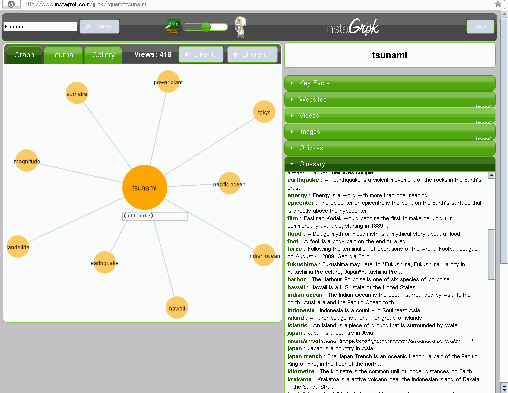
データソースはウェブ上のデータのようだが,内部でどのようなエンジンを使っているのかは不明である.
Glossary 欄の連想語群だけでも簡単に抜き出せると便利かもしれないと思い,次のツールを作った.並一通りの類義語辞書的な語群とは異なった連想語が得られておもしろい.ウェブベースなので,"Japan", "Pacific ocean" などの固有名詞などを入れると時事的な連想語が現われたりする.100語までのリストが出力される.
2012-10-18 Thu
■ #1270. 類義語ネットワークの可視化ツールと類義語辞書 [web_service][thesaurus][link][synonym][dictionary][polysemy]
[2010-08-11-1]の記事「#471. toilet の豊富な婉曲表現を WordNet と Visuwords でみる」で,オンラインで利用できる類義語ネットワークの可視化ツールを2点紹介したが,同趣旨のツールとして WordNet のデータベースに基づいた Graph Words を追加したい.以下に,関連するツールのリンクを挙げておく.
・ Graph Words: フリー.出力がシンプル.
・ Visuwords: フリー.出力が凝っている.
・ Visual Thesaurus: 有料だがトライアルあり.出力が凝っている.
あわせて,今では通常の類義語辞典もオンラインで豊富にアクセスできるが,いくつか挙げておこう.
・ Merriam-Webster Thesaurus: 語義ごとに豊富な類義語群が得られる.
・ The Free Online Dictionary, Thesaurus and Encyclopedia: 語義もついており,単語学習によい.
・ Thesaurus.com: 手早く類義語リストを得られる.
・ HyperDictionary.com: 上に同じ.
類義語リストを簡便に得られるスタンドアロンの辞書ソフトウェアとしては,以下のものを利用することがある.
・ WordWeb:英語辞書ソフトウェアとして人気がある.
・ TheSage's English Dictionary and Thesaurus:インターフェースがきれい.
歴史英語類義語辞典は,以下の二つ.
・ HTOED (Historical Thesaurus of the Oxford English Dictionary)
・ TOE (A Thesaurus of Old English)
類義語ネットワークの可視化ツールをいじっているうちに,単にキーワードに関連する語彙のネットワークを示すものとしてだけでなく,キーワードの語義の広がりを示すものとして利用することができることを発見した.例えば,Graph Words で多義語 "star" のネットワークを覗いてみると,およそ区別される語義ごとに枝のグループができていることがわかる.各語義が,単語置換による示唆というかたちではあるが,荒っぽく「定義」されているといえる(以下,拡大は画像をクリック).
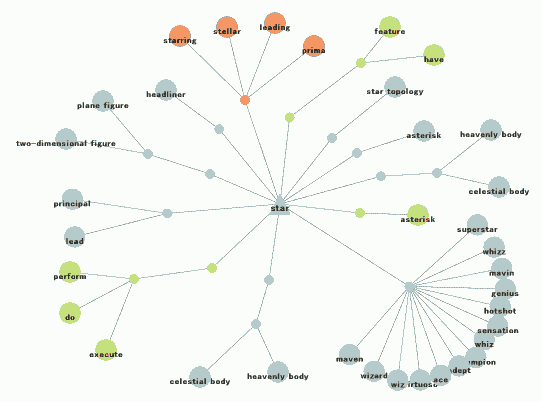
"star" のような多義語については,類義語可視化ツールは語義の広がりを見せてくれる,辞書代わりのツールとしても有効なのではないか.
2012-08-28 Tue
■ #1219. 強意語はなぜ種類が豊富か [intensifier][adverb][synonym][thesaurus][sociolinguistics]
強意語に作用する「限界効用逓減の法則」については,[2012-01-14-1]の記事その他で触れてきた.強意表現は使われてゆくうちに徐々に強意が失せてくるため,話者は新たな強意表現を求める.そして,その新表現も強度が薄まり,次の表現が欲しくなる.この永遠のサイクルに潜む原理が「限界効用逓減の法則」である.新表現の欲求の背後には,真の強意を伝えたいという意図が働いていることは間違いないが,それだけではない.話者の独創的でありたいという希望,巧みな話術を見せたいという希望,聞き手の関心を惹きたいという希望が,その根底にある.このような欲求や希望が原動力となって,次々と新しい強意語が生まれてくる.
しかし,古い強意語がいつでも新しい強意語にとって代わられるわけではない.古い語が新しい語と併存する場合も少なくない.その場合,強意語群は累々と積み重ねられてゆき,共時的にみれば,非常に種類の豊富な類義語カテゴリーとなる.別の場合には,強意語は,ある話者集団にのみ好んで用いられる shibboleth としての役割を果たす."group identification" (Peters 271) に関与しやすい語類として,社会言語学的にも重要な語類である.
標題の質問に対しては,もう1つの回答があるように思われる.ここで取り上げている強意語とは,厳密にいえば maximizer と booster を指すが,とりわけ booster は種類が豊富である.それは,maximizer が程度の最高点を表わすという意味で点的だが (ex. absolutely, completely) ,booster は漠然と程度の高さを表わすという点で線的であり,覆う範囲がそれだけ広いからだ (ex. greatly, highly, uncommonly) .booster の供給源に感情を表わす語が少なくないが (ex. desperately, terribly, violently) ,これは感情もまた線的であり,覆う幅が広いことと関係しているだろう (Peters 271) .そして,感情を表わす語は,言うまでもなく,種類の豊富な語群である.
限界効用逓減の法則,コミュニケーション上の欲求,group identification のための手段,漠然とした程度の広がり,感情語に代表される無尽蔵の供給源.これらの要因によって,強意語は,通時的なサイクルを経験し続けるだけでなく,共時的なヴァリエーションを広げてゆくのである.
日本語の強意語については,[2012-01-19-1]の記事「#997. real bad と「すごいヤバい」」を参照.
・ Peters, Hans. "Degree Adverbs in Early Modern English." Studies in Early Modern English. Ed. Dieter Kastovsky. Mouton de Gruyter, 1994. 269--88.
2012-01-14 Sat
■ #992. 強意語と「限界効用逓減の法則」 [intensifier][adverb][semantic_change][bleaching][euphemism][flat_adverb][thesaurus][synonym][swearword]
[2012-01-12-1], [2012-01-13-1]の記事で,副詞としての very の起源と発達について見てきた.強意の副詞には,very の場合と同様に,本来は実質的な語義をもっていたが,それが徐々に失われ,単に程度の激しさを示すだけとなったものが少なくない.awfully, hugely, terribly などがそれである.意味変化の領域では,意味の漂白化 (bleaching) が起こっていると言われる.
おもしろいのは,このような強意の副詞がいったん強意の意味を得ると,今度は使い続けれられるうちに,意味の弱化をきたすことが多いことである.ちょうど修辞的な慣用句が使い古されて陳腐になると,本来の修辞的効果が弱まるのと同じように,強意語もあまりに頻繁に用いられると本来の強意の効果が目減りしてしまうのである.
効果の目減りということになれば,経済用語でいう「限界効用逓減の法則」 (the law of diminishing marginal utility) が関与してきそうだ.限界効用逓減の法則とは「ある財の消費量の増加につれて,その財を一単位追加することによる各個人の欲望満足(限界効用)の程度は徐々に減る」という法則である.卑近な例で言えば,ビールは1杯目はおいしいが,2杯目以降はおいしさが減るというのと原理は同じである(ただし,私個人としては2杯目だろうが3杯目だろうがビールは旨いと思う).強意語は,意味における限界効用逓減の法則を体現したものといえるだろう.
さて,強意語から強意が失われると,意図する強意が確実に伝わるように,新たな強意語が必要となる.こうして,薄められた古い表現は死語となったり,場合によっては使用範囲を限定して,語彙に累々と積み重ねられてゆく一方で,強意のための語句が次から次へと新しく生まれることになる.この意味変化の永遠のサイクルは,婉曲表現 (euphemism) においても同様に見られるものである.
では,新しい強意語はどこから湧いてくるのだろうか.婉曲表現の場合には,[2010-08-09-1]の記事「#469. euphemism の作り方」で見たように,そのソースは様々だが,強意語のソースとしては特に口語・俗語において flat adverb (##982,983,984) や swearword が目立つ.新しい強意語には誇張,奇抜,語勢が要求されるため,きびきびした flat adverb やショッキングな swearword が選ばれやすいのだろう.前者では awful, dead, exceeding, jolly, mighty, real, terrible, uncommon,後者では damn(ed), darn(ed), devilish, fucking, goddam, hellish などがある.
HTOED (Historical Thesaurus of the Oxford English Dictionary) で強意副詞を調べてみると,この語群の移り変わりの激しさがよくわかる."the external world > relative properties > quantity or amount > greatness of quantity, amount, or degree > high or intense degree > greatly or very much [adverb]" とたどると,536語が登録されているというからものすごい.その下位区分で,very の synonym として分類されているものに限っても以下の47語がある.壮観.
full (c888), too (c888), well (c888), swith (971), right (?c1200), much (c1225), wella (c1275), wol(e (a1325), gainly (a1375), endly (c1410), very (1448), jolly (1549), veryvery (1649), good (a1655), strange (1667), bloody (1676), ever so (1690-2), real (1771), precious (1775), quarely (1805), trés (1819), freely (1820), powerful (a1822), heap (1832), almighty (1834), all-fired (1837), gradely (1850), hard (1850), heavens (1858), veddy (1859), some (1867), spanking (1886), socking (1896), hefty (1898), velly (1898), dirty (1920), oh-so (1922), snorting (1924), hellishing (1931), thumpingly (1948), mega (1968), mondo (1968), mucho (1978), seriously (1981), well (1986), way (1987), stonking (1990)
2011-08-22 Mon
■ #847. Oxford Learner's Thesaurus [lexicography][dictionary][thesaurus][lexicology][synonym][semantic_prosody]
英語には数多くの類義語辞典 (thesaurus) があり,[2010-08-11-1]の記事「toilet の豊富な婉曲表現を WordNet と Visuwords でみる」で示したようにオンライン版辞書や類義語の視覚化ツールも少なからず存在する.歴史的類義語辞典としても,近年 HTOED (Historical Thesaurus of the Oxford English Dictionary) や TOE (A Thesaurus of Old English) が公開されており,活況を呈している.
共時的にも通時的にも英語語彙の研究環境は著しく整ってきているが,外国語としての英語の学習環境という観点からは類義語辞典の役割はこれまであまり目立ってこなかった.学習の観点からの類義語の解説については,OALD や LDOCE などの老舗学習者用英英辞書も力を入れてきており,発信用の英語学習にも役立つおもしろい解説が増えてきたが,類義語の列挙と解説に特化した学習者用類義語辞典というものはあまり出版されていなかった.唯一,American Heritage Thesaurus for Learners of English (2002) があったくらいだが,2008年になって標題の Oxford Learner's Thesaurus (OLT) が出版された.この辞書は私の手元にもあったが,これまで特に強い関心はなく,意識的に開いたことはほとんどなかった.だが,最近 Komuro and Ichikawa による OLT の辞書分析を読んで,学習者用類義語辞典に興味がわいてきた.辞書は特徴を知っておくことが重要なので,以下に OLT について知っておいてよい点を,Komuro and Ichikawa を参照しながらいくつか挙げておきたい.
・ OLT は,Oxford Thesaurus of English (2000, 2004) からの派生物ではなく,むしろ OALD7 (2005) との関係が強い (12) .実際に,OALD7 の類義語解説が多く OLT に反映されている.(つまり,最初から学習者向けにチューニングされており,平易でかゆいところに手が届く記述が期待され,実際にそのようになっている.)
・ OLT に限らないが,学習者用類義語辞典の主たる機能は,"(1) make users aware of different connotations or shades of meaning synonyms have and to (2) enable users to choose and use the most appropriate word, which may not be part of their (active) vocabulary, in order to express their idea" (14) .
・ 見出し語数は学習者向けに選ばれた1973個で,単語だけでなく複合語や句が見出し語となっている場合もある (16) .
・ 1つの見出し語に与えられている類義語の数は,最頻値をとると5--6個 (26) .多すぎず,少なすぎず,学習者にとって適切.
・ 挙げられている例文はおおむね適切で,CD-ROM版では各類義語に対して平均3.7個ほどの例文が挙げられている (29) .
・ 類義語間の区別にとりわけ重要な register のレーベルや解説が質量ともに充実している (35--45) .特に解説は読み物としておもしろく書かれている (45, 49) .
・ 意味の強度によって区別される類義語群について,視覚的な "synonym scales" なる提示法が導入されており,学習上,非常に効果的である (49--52) .
全体として Komuro and Ichikawa は "a groundbreaking learner's thesaurus (55) と高い評価を与えており,特に最後の "synonym scales" の評価については,私も実際に見てみたが同感.例えば,afraid の類義語の synonym scale は以下の通り.このように一覧されると,頭が整理される.

レビュー論文を読んでこれから積極的に OLT を利用してみたいと思った.また,英語学習に役に立ちそうであることは言うに及ばず,語彙論や意味論の研究に際しても,本格的な類義語辞典やその他の辞書を用いる前の見当づけやテーマ探しにも使えそうだという印象をもった.例えば,synonym scale を与えられている以下の126語の見出し語から適当な類義語群を選び出し,コーパスを用いて semantic_prosody の研究をするというのもおもしろそうだ.
admiration [n], afraid [a], anger [n], anger [v], angry [a], annoy [v], approval [n], bad [a], beautiful [a], cheap [a], childhood [n], close [a], cold [a], concern [n], convincing [a], crazy [a], crisis [n], defeat [v], delicious [a], delight [v], determine [v], dictate to sb [pv], disappoint [v], disapprove [v], disgusting [a], distress [n], embarrass [v], emotion [n], exciting [a], expose [v], fast [a], fat [a], fear [n], flush [v], frequent [a], friendship [n], frighten [v], frightening [a], frown [v], funny [a], gap [n], glad [a], happy [a], hate [v], hatred [n], high [av], hill [n], hot [a], hungry [a], hurt [v], hysterical [a], immediate [a], impress [v], inspire [v], interest [v], interested [a], interesting [a], ironic [a], like [v], likely [a], lonely [a], lose your temper [idiom], love [n], love [v], mad [a], magnificent [a], mean [a], mentally ill [a], minute [n], modern [a], negative [a], nice [a], odour [n], pain [n], painful [a], plain [a], please [v], pleasure [n], poor [a], possibility [n], praise [v], press [v], pressure [n], probably [adv], quite [adv], radical [a], rain [v], rape [v], recession [n], recommend [v], remarkable [a], respect [v], revenge [n], ridiculous [a], rough [a], rude [a], ruin [v], run [v], ruthless [a], sad [a], serious [a], shock [n], shock [v], show [v], small [a], smile [v], soak [v], sorry [a], star [n], strict [a], suppress [v], sure [a], surprise [v], take advantage of sb/sth [v], taste [n], tear [v], temper [n], tight [a], tired [a], ugly [a], unhappy [a], upset [a], violent [a], well [a], wet [a], worry [v]
・ American Heritage Thesaurus for Learners of English. Boston & New York: Houghton Mifflin Harcourt Publishing Company, 2002.
・ Oxford Learner's Thesaurus: A Dictionary of Synonyms. Oxford: OUP, 2008.
・ Komuro, Yuri and Yasuo Ichikawa. "An Analysis of the Oxford Learner's Thesaurus: A Dictionary of Synonyms." Lexicon 41 (2011): 11--59.
・ Oxford Advanced Learner's Dictionary. 7th ed. Oxford: OUP, 2005.
2011-05-12 Thu
■ #745. 結婚の誓いと wedlock [etymology][folk_etymology][royal_wedding][suffix][thesaurus][youtube][book_of_common_prayer]
先日の William & Catherine の royal wedding の「結婚の誓約」 (marriage vows) について,transcript が BBC: Royal wedding: Transcript of marriage service に掲載されている(本記事の末尾に再掲).誓約の場面は,こちらの Youtube 動画よりどうぞ.
結婚式を含む宗教的儀式の言語は,古い表現を豊富に残していることが多い.英国国教会の marriage vows は,1549年に出版された The Book of Common Prayer の誓約が土台となっており,以降,軽微な改変はあったものの,ほぼそのままの形で現在にまで伝わっている.したがって,今回の誓いも現代英語より近代英語を体現しているというほうが適切であり,古風な表現に満ちている.聖書の言語と同様,歴史英語の入門にはうってつけの教材だろう.
さて,英国国教会の長 the Archbishop of Canterbury が用いた古風な表現の1つに「結婚(している状態);婚姻」を表わす wedlock がある.holy wedlock と使われているように,宗教的に認められた婚姻関係を指すことが多い.語形をみる限り,lock 「錠前」と結びつけられるのではないかと考えるのが普通だろう.新郎新婦が "till death us do part" と誓い合っているように,夫婦の愛が錠前のように固く結びつけられるという含意ならばロマンチックだが,既婚者の多くが真っ先に想像する「結婚の錠前」とは,日常生活上のあれやこれやの制限のことだろう."Wedlock is a padlock." なる金言がある通りである.中世の登記には,独身者はラテン語で solutus 「放たれた,つながれていない」と表記されたが,これもよく理解できる.
wedlock を上記のように「結婚という錠前」と解釈する語源は言い得て妙,と膝をたたく既婚者も少なくないと思われるが,これはよくできた民間語源 ( folk etymology ) である.語源学の正しい教えに従えば,既婚者は錠前から解放される.wedlock は古英語より使われていた本来語で,当時は wedlāc という形態だった.-lāc は動作名詞を作る接尾辞で,wed 「誓い」と合わせて,本来は「誓いの行為;誓約」ほどの意味だった.そこから「結婚の誓約」の語義が生じ,中英語期には「結婚(している状態)」を表わすようになったのである.接尾辞 -lāc は,古英語では他にも以下のような派生語に見られたが,現代にまで残ったのは wedlock のみである.
brȳdlāc "nuptials", beadolāc "warfare", feohtlāc "warfare", heaðolāc "warfare", hǣmedlāc "carnal intercourse", wiflāc "carnal intercourse", rēaflāc "robbery", wītelāc "punishment", wrōhtlāc "calumny"
wedlock や marriage は類義語が多い.Visuwords の marriage や wedlock で類義語の関係図を見ると,結婚がすぐれて社会的な制度,社会的な拘束力のある「誓約の行為」であることを実感することができる.類義語の視覚化ツールとしては,[2010-08-11-1]の記事「toilet の豊富な婉曲表現を WordNet と Visuwords でみる」で紹介した Visual Thesaurus も参考までに.
Archbishop to Prince William: William Arthur Philip Louis, wilt thou have this woman to thy wedded wife, to live together according to God's law in the holy estate of matrimony?
Wilt thou love her, comfort her, honour and keep her, in sickness and in health; and, forsaking all other, keep thee only unto her, so long as ye both shall live?
He answers: I will.
Archbishop to Catherine: Catherine Elizabeth, wilt thou have this man to thy wedded husband, to live together according to God's law in the holy estate of matrimony? Wilt thou love him, comfort him, honour and keep him, in sickness and in health; and, forsaking all other, keep thee only unto him, so long as ye both shall live?
She answers: I will.
The Archbishop continues: Who giveth this woman to be married to this man?
The Archbishop receives Catherine from her father's hand. Taking Catherine's right hand, Prince William says after the Archbishop: I, William Arthur Philip Louis, take thee, Catherine Elizabeth to my wedded wife, to have and to hold from this day forward, for better, for worse: for richer, for poorer; in sickness and in health; to love and to cherish, till death us do part, according to God's holy law; and thereto I give thee my troth.
They loose hands. Catherine, taking Prince William by his right hand, says after the Archbishop: I, Catherine Elizabeth, take thee, William Arthur Philip Louis, to my wedded husband, to have and to hold from this day forward, for better, for worse: for richer, for poorer; in sickness and in health; to love and to cherish, till death us do part, according to God's holy law; and thereto I give thee my troth.
They loose hands. The Archbishop blesses the ring: Bless, O Lord, this ring, and grant that he who gives it and she who shall wear it may remain faithful to each other, and abide in thy peace and favour, and live together in love until their lives' end. Through Jesus Christ our Lord. Amen.
Prince William takes the ring and places it upon the fourth finger of Catherine's left hand. Prince William says after the Archbishop: With this ring I thee wed; with my body I thee honour; and all my worldly goods with thee I share: in the name of the Father, and of the Son, and of the Holy Ghost. Amen.
The congregation remains standing as the couple kneels. The Archbishop says: Let us pray.
O Eternal God, Creator and Preserver of all mankind, giver of all spiritual grace, the author of everlasting life: send thy blessing upon these thy servants, this man and this woman, whom we bless in thy name; that, living faithfully together, they may surely perform and keep the vow and covenant betwixt them made, whereof this ring given and received is a token and pledge; and may ever remain in perfect love and peace together, and live according to thy laws; through Jesus Christ our Lord. Amen.
The Archbishop joins their right hands together and says: Those whom God hath joined together let no man put asunder.
The Archbishop addresses the congregation: Forasmuch as William and Catherine have consented together in holy wedlock, and have witnessed the same before God and this company, and thereto have given and pledged their troth either to other, and have declared the same by giving and receiving of a ring, and by joining of hands; I pronounce that they be man and wife together, in the name of the Father, and of the Son, and of the Holy Ghost. Amen.
The Archbishop blesses the couple: God the Father, God the Son, God the Holy Ghost, bless, preserve, and keep you; the Lord mercifully with his favour look upon you; and so fill you with all spiritual benediction and grace, that ye may so live together in this life, that in the world to come ye may have life everlasting. Amen.
・ ジョーゼフ T. シップリー 著,梅田 修・眞方 忠道・穴吹 章子 訳 『シップリー英語語源辞典』 大修館,2009年.
2011-02-04 Fri
■ #648. 古英語の語彙と廃語 [oe][lexicology][word_formation][thesaurus][synonym]
古英語の語彙が現代までにどれだけ残存しているか,どれだけ消失したかについては[2010-07-21-1]の記事で話題にした.古英語語彙の大規模な消失は,英語が中英語期以降にフランス語を始めとする様々な外国語から語彙的な影響を受け,多くの本来語が借用語で置き換えられるに至ったとして説明されることが多いが,消失傾向を促進するある特徴が古英語語彙体系に内在していたと考えることもできるかもしれない.バケから,古英語語彙の消失について述べている箇所を引用しよう.
もう一つの消失の原因は,疑いもなく,同じ概念系統の語形の中に存在していた封建的関係である.ある語が消失していく度に,語群全体がそれとともに分解してきた.これは情熱を抱くに足る研究であり,ぜひとも奨励しておきたい.古期英語の実詞 þeod 「国民,種族」およびその複合語あるいは派生語は,発生的に þeoden 「首長,王子,王」および( geþeode 「(話し)ことば」と結びついていたが,それらの政治・文化上のすべての親族関係語とともに消えてしまった.Wer 「男,英雄,亭主」および werod 「大勢,軍団」についても同様である.この点について,古期英語辞典を引くこと以上に示唆を得るものはない.ある用語が衰えると語彙面全体が崩れ落ちてしまう.その原因は多様で,しばしば社会学的であったり,政治的であったりする.(22)
þeod は古英語では高頻度語かつ基本語であり,これに基づいた複合語や派生語が数多く存在した.þeod を中心とした関連語彙が,古英語話者の「国」観,「民族」観,ひいては世界観を表現していたといっても過言ではない.しかし,þeod という語自体が何らかの事情で徐々に衰退し,ついには消失してしまうと,独特な世界観を構成していた扇の要が壊れてしまうことになり,関連語彙もその存在基盤を失うことになる.はたして,þeod の世界観全体が忘れられることになるのである.皮肉なことに,古英語の語形成は基底となる語を元にした複合 ( composition ) と派生 ( derivation ) によって特徴づけられるために,基底語が消失してしまうと関連語彙も総崩れとなりがちだということである.
バケが基底語(主)と関連語彙(従)との関係を「封建的関係」と呼んでいるのは興味深い.君主が崩れることによって家臣すべてが総崩れとなり,封建制(=世界観)そのものが機能しなくなるという巧みな比喩が,この表現に隠されている.
基底となる þeod が消失した原因は様々だろうが,1つには次々に現われてきた類義語からの圧力が作用したと思われる.Historical Thesaurus of the Oxford English Dictionary によると,þeod の類義語は "the external world > the living world > people > people > [noun]" の項に見つけることができる.18語の歴史的類義語を初出年とともに提示しよう.
| word | first year |
|---|---|
| thede | 855 |
| folk | c888 |
| lede | 971 |
| mannish | OE |
| birth | a1300 |
| nation | c1330 |
| people | a1375 |
| tongue | 1382 |
| race | 1572 |
| family | 1582 |
| the mass | 1621 |
| public | 1709 |
| nationality | 1832 |
| peoplet | 1872 |
| peoplehood | 1879 |
| La Raza | 1927 |
| ethnic minority (group) | 1945 |
| ethnogenesis | 1962 |
þeod という語の消失は,実際には徐々に進行しており,1400年くらいまでは使用されていた.上の表を眺めると,þeod は突如消えたわけではなく,中英語期に他の類義語とのせめぎ合いのなかで徐々に忘れられていったというシナリオが描けそうである.
・ ポール・バケ 著,森本 英夫・大泉 昭夫 訳 『英語の語彙』 白水社〈文庫クセジュ〉,1976年.
2010-08-11 Wed
■ #471. toilet の豊富な婉曲表現を WordNet と Visuwords でみる [web_service][thesaurus][synonym][link]
昨日の記事[2010-08-10-1]で,toilet の婉曲表現が豊富であることを見た.複数の辞書を引き比べていて感じたが,最近の(特に学習者用)英英辞書は類義語間の使い分けや語法の解説が詳しく,類義語辞典 ( thesaurus ) ならずともそれに準ずる実用的な類義語リストが得られて有用である.それでも,類義語リストの提示に特化した thesaurus にはかなわない.
最近はWeb上にも thesaurus が豊富に転がっており,例えば the Free Online Dictionary, Thesaurus and Encyclopedia や Thesaurus.com などが手軽に利用できる.昨日はWeb辞書は調べていなかったが,追加すべき「トイレ」代替表現がいくつかあるようである.
Web上の本格的な thesaurus として有名なのは,Princeton University の George A. Miller の指揮によって編纂されている WordNet である.自然言語処理の世界では WordNet と連係しながら様々な応用が図られているようだ.現時点では Version 3.0 のデータベースがこちらから検索可能となっており,例えば toilet の検索結果はこの通り である.上位語 ( hypernym ) や下位語 ( hyponym ) へも一瞬のうちにアクセスでき,英語の意味の世界が手軽に扱えるようになったことを実感できる.また,WordNet 3.0 database statistics には英語の名詞の平均語義数が1.24なのに対して動詞の平均語義数は2.17であるなど,有用な情報がある.
語の意味の世界を視覚化したネットワーク図が手軽に得られるようなWeb上のサービスも出てきた.Visual Thesaurus がその1つだが有料.フリーでも以下のような簡便なネットワーク図が得られる.
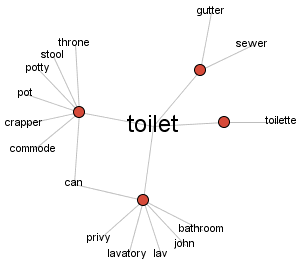
Visual Thesaurus は有料なので,代わりに私がたまに使っているフリーのものが Visuwords.上記の WordNet のデータベースと連係している.出力されるネットワーク図は以下の通り.以下のイメージをクリックして現われる拡大画像,あるいは Visuwords で直接 toilet を検索した出力で,詳細を確かめてみてほしい.
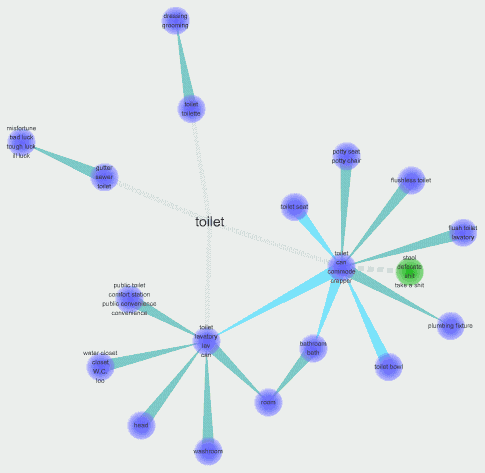
2010-08-10 Tue
■ #470. toilet の豊富な婉曲表現 [euphemism][thesaurus][japanese][synonym]
昨日の記事[2010-08-09-1]で euphemism を紹介した.euphemism の典型例の1つに「トイレ」を表す1群の語句がある.英語に限らずおそらく多くの言語で「トイレ」は直接的に指すのがはばかられる語であり,間接的に指す表現が豊富に発達していると思われる.「トイレ」などの婉曲表現が豊富に発達するのは,直接性を和らげるために様々な方法で作り出された間接的な表現が,しばらく使用されていると再び直接性を帯びるようになってしまい,次なる間接的な表現が必要とされるからである.こうして,かつては間接的だった表現が半死半生のままに累々と語彙のなかに積み残されることになる.一般に,タブー語に対応する婉曲表現が豊富なのはこのような理由による.
では,具体的に英語の toilet に相当する表現を見てみよう.複数の辞書や類義語辞典 ( thesaurus ) で調べて和集合を取ったところ,実に86の語句を収集することができた.壮観.
backhouse, basement, bathroom, bedpan, biffy, bog, can, carzey, chamber, chamber pot, chemical closet, chemical toilet, cloakroom, cloaks, closet, cludgie, comfort station, commode, convenience, conveniences, crapper, donagher, don(n)icker, dunny, earth closet, facilities, facility, gents, gutbucket, head, hopper, jakes, jerry, john, johnny, johnny house, jordan, kahsi, karzy, khaziv, ladies , ladies' room, latrine, lav, lavatory, lavvy, little boy's room, little girl's room, loo, lounge, men's room, middy, Mrs. Chan, necessary, outhouse, piss pot, piss-house, pisser, pot, potty, potty-chair, powder room, privy, public conveniences, relief station, restroom, shitter, shouse, stool, the smallest room, throne, throne room, throttle pit, thunder mug, thunder-bowl, thunderbox, toilet, toilet room, toilette, toot, urinal, washroom, Washroom, water closet, WC, women's room
ただ,ここでは地域変種,使用域 ( register ),含蓄的意味 ( denotation ),トイレの種類の別などは考慮に入れず,フラットに並べただけなので使用上は要注意.(← 後記:denotation ではなく connotation の誤りでした.)
日本語も同様に調べてみた.英語等からの借用語も含めて実に48の表現があり,同じく壮観.
浅草,隠所(いんじょ),ウオーター・クロゼット,ウオッシュルーム,お下(しも),お下屋敷,御手水(おちょうず),お手洗い,おトイレ,厠(かわや),勘考場(かんこうば),潅所(かんじょ),化粧室,後架(こうか),高野(こうや),御不浄,尿殿(しどの),ジョーン,西浄(せいちん),雪隠,洗面所,WC,手水所(ちょうずどころ),手水場,手洗い,手洗所,手洗場(てあらいば),トイレ,トイレット,トイレットルーム,東司(とうす),東浄(とうじょう,とうちん),トワレット,パウダールーム,憚(はばか)り,ひが場,尾閭(びりょ),不浄,不浄場(ば),屁厠(へがわ),便室(べんしつ) ,便所,メンズルーム,用場(ようば) ,ラバトリー,ルー,レストルーム,レディーズルーム
いずれの言語の表現も,昨日の記事[2010-08-09-1]で示した様々な euphemism の作り方が適用されているようだ.
Powered by WinChalow1.0rc4 based on chalow